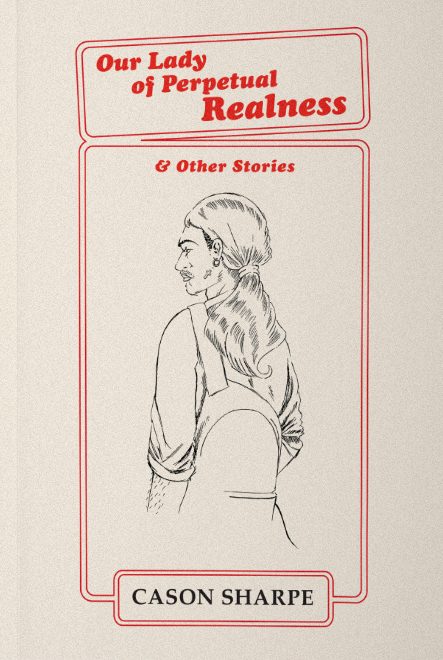
Review by Rachel Jansen
It would be a mistake to assume Cason Sharpe’s slim debut, Our Lady of Perpetual Realness & Other Stories, is a quick read. These stories are dense and complex, deserving of a slow eye and enough carpet space to pace between pages. Sharpe grew up in Toronto and currently resides in Montreal–two cities that serve as urban backdrops for all six stories. And while the stories in Our Lady of Perpetual Realness are independent from one another, there is at least one constant: a young male protagonist who is a queer person of colour, often working a menial job to make ends meet, sometimes reflecting on a romantic relationship, and always acutely aware and refreshingly honest about the complexities of human interactions.
Written in sparse and exacting prose, Sharpe turns our eyes to the seemingly mundane–friendships, jobs, outings, doubts–things we often erase from our memories in favour of our more glamorous moments. In this way, he reveals to readers what we already know but don’t often acknowledge: that it’s these everyday incidents that comprise a life, not those few times we step outside the ordinary.
This is not to say Sharpe’s stories are boring or trivial; on the contrary, they are rife with tension and filled with dynamic characters that make the stories swerve in unexpected ways. In the opening story, “Money Success Fame Glamour,” for example, the protagonist, an inexperienced seventeen-year-old in a band, becomes entranced by his (often absent) classmate Sid, an aspiring pornstar who lives alone. Twinned in unexpected ways, these two young men test the boundaries of themselves and what society expects of them in a small apartment above Pizza Pizza.
Power dynamics, systematic oppression, and societal hierarchies loom large over Sharpe’s stories. Often, the protagonist is faced with a choice of what he wants to do, and what he needs to do in order to make enough money to buy more for supper than a can of tuna. In “Scam,” the story set in a fraudulent magazine subscription office, the protagonist struggles to “be a Shark” like his boss, who never has to actually sell any of the subscriptions himself. The protagonist has to choose between either making a corrupt sale by the end of the week, or getting fired and going broke. In “Darling if You Love Me,” Sharpe’s most metaphorical story, Sweetheart, an employee at a movie store, meets The Man, a father of two from the suburbs who frequents the store’s small porno section. Sweetheart is pressed for money. Really pressed. And The Man offers up a solution: a visit to a nearby hotel so the pair can enact out scenes from the video “Big Black Cocks” in exchange for two hundred bucks, which he lowers to one hundred after the deed is done.
Such quandaries add to a dreary undercurrent in this collection, best expressed by a line from the story “The Coming Attractions:” “You sense yourself becoming hardened against the world in a way that feels disappointing yet inevitable” (56). This idea, of inevitability, of loss of control in a world stacked against you, permeates most of the stories. In “California Underwater,” my favourite story of the collection, the main character, Mikey, undergoes an existential crisis post-graduation: “Art school was such a waste of time and money in retrospect. From the first day it was clear who would eventually make a career out of it and who wouldn’t” (21). Such bleak statements of fact leave the reader, like the protagonist, wondering: what’s the point? The Sharks were born Sharks and will always be Sharks and the Non-Sharks were born Non-Sharks and will always be Non-Sharks. And won’t we all be dead soon enough anyway?
Sharpe has an answer for this too, though. Because for each feeling of inevitable disappointment, there is a feeling of redemption: a small but significant moment when the protagonist takes back control, even if that just means ignoring the bank statement and spending money to ferry to the beach for sunset. Or the triumphant moment in the collection’s title story, “Our Lady of Perpetual Realness,” when, after a night of carousing in drag with his friends, the protagonist turns the dawn-filled street he feared earlier on into a catwalk. For every degrading work situation, there’s an ally for the protagonist to gripe with; for every existential crisis, there’s a friend’s sister to pool hop with; for every homophobic friend’s boyfriend, there’s another friend to share a conspiratorial giggle and beer with. Life is fucked up. It’s unfair, unrelenting, irrational. But as one of Sharpe’s character points out to another in “The Coming Attractions,” “you might like it better if you try to enjoy it” (54). With candor and grit and the gleam of an unexpected image, Sharpe’s collection will help you do just that.
Rachel Jansen is originally from Mississauga, Ontario, though she has spent the past eight years in Vancouver. Her work has been published in Geist, Room Magazine, Hamilton Arts & Letters, and The Maynard.